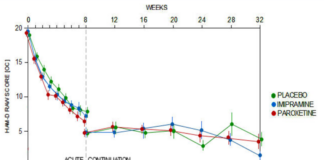Tag: psychiatric medication
Insane Medicine, Chapter 8: Treatment Traps and How to Get Out...
Sami Timimi provides a discussion of the ways medication may be helpful for some, and advice and information on discontinuing psychiatric drugs.
Seeds of Hope: A Journey Toward Truth about Psych Drugs
I believed I needed the drugs to keep me going, because every time I tried to get off, I couldn’t function. Years later, I learned the truth: The meds had only been masking the festering sores beneath the surface of my stability.
Treated Infections in Childhood Linked with Later Mental Health Service Use
Severe infections requiring hospitalizations increased the risk of hospital contacts due to mental disorders by 84% and the risk of psychotropic medication use by 42%.
Is Anti-Anxiety Medication the Next U.S. Drug Crisis?
From NBC News: "Prescriptions have increased more than 60 percent in the last two decades and overdose deaths involving them have more than quadrupled...
Here’s a Surprising Extreme Heat Risk for 1 in 6 Americans
From NBC News: "White is among the one in six Americans who take psychiatric medications. Many can interfere with the activity of the hypothalamus, a...
Dr. David Healy: Seeking a Cure for Protracted, Medication-Related Sexual Dysfunction
An interview with Dr. David Healy, internationally respected psychiatrist, psychopharmacologist, scientist, and author, discussing Post SSRI Sexual Dysfunction (PSSD) and his innovative approach to finding a cure.
Irving Kirsch: The Placebo Effect and What It Tells Us About...
Dr Irving Kirsch is Associate Director of the Program in Placebo Studies and lecturer in medicine at the Harvard Medical School and Beth Israel Deaconess Medical Center. He joins us this week to discuss his research into the placebo effect and what it tells us about the efficacy of antidepressant drugs.
Will Hall: A Harm Reduction Approach to Mental Health and Wellbeing
Will is a mental health advocate, counsellor, writer, and teacher. Will advocates the recovery approach to mental illness and is recognised internationally as an innovator in the treatment and social response to psychosis.
Benzodiazepine Awareness: Raising Global Understanding
Benzodiazepine Awareness seeks to raise global awareness of iatrogenic benzodiazepine dependence, the dangers of its adverse effects and the associated withdrawal syndrome, which can last for years.
David Healy: Making Medicine Safer for All
Doctor David Healy from Bangor University in Wales talks about prescribing practice, medicine safety and pharmaceutical regulation.
The Harm Reduction Guide to Coming Off Psychiatric Drugs
Based on more than 10 years work in the peer support movement,The Icarus Project and Freedom Center’s 52-page guide is used internationally by individuals, families, professionals, and organizations to support reducing and coming off psychiatric drugs.
CEP Members Publish New Book: ‘The Sedated Society’
The Council for Evidence-Based Psychiatry announces the release of a new book called 'The Sedated Society: The Causes and Harms of our Psychiatric Prescribing Epidemic.'...
Southern Vapors: A Comeback Story Not Born of Chemistry
Imagine my excitement, the hope that relief from the sucking tar of misery that dogged too many of my days was within my reach. From that moment and for thirty years to follow, I was the willing guinea pig for any number of drugs. Nothing helped for long.
Chemical or Psychological Psychotherapy?
Prolonged use of psychotropic drugs can cause permanent brain damage, which can make it impossible for the patient ever to return to normal, and also cause a return to the disease state the patient originally came from.
Curing Schizophrenia via Intensive Psychotherapy
I believe that an Intensive Psychotherapy can lead to healing and, often, a cure of psychotic states. By cure I mean the cessation of delusions and hallucinations, and a gradual titration off of antipsychotic medication, with the cure lasting—even without continuing psychotherapy.
Study 329 Taper Phase
Most doctors still affect surprise at the idea SSRIs might come with withdrawal problems. Regulators knew very clearly since 2002 about the problems, but have decided to leave any communication of these issues in company hands.
Study 329 Continuation Phase
All the fuss about Study 329 centers on its 8-week acute phase. But this study had a 24-week Continuation Phase that has never been published. Until Now.
Researchers Discover How Antipsychotics Lead To Parkinsonism
A new study published this month in the journal Neuron identifies the mechanism by which antipsychotic drugs can induce parkinsonism, a condition involving movement...
Restoring Study 329: Letter to BMJ
When we set out to restore GSK’s misreported Study 329 of paroxetine for adolescent depression under the RIAT initiative, we had no idea of the magnitude of the task we were undertaking. After almost a year, we were relieved to finally complete a draft and submit it to the BMJ, who had earlier indicated an interest in publishing our restoration. But that was the beginning of another year of peer review that we believed went beyond enhancing our paper and became rather an interrogation of our honesty and integrity. Frankly, we were offended that our work was subject to such checks when papers submitted by pharmaceutical companies with fraud convictions are not.
The Recovery After an Initial Schizophrenia Episode (RAISE) Study: Notes from...
I was a psychiatrist who participated in the Recovery After an Initial Schizophrenia Episode Early Treatment Program (RAISE ETP). Although I welcomed the positive headlines that heralded the study's results, the reports left me with mixed feelings. What happened to render the notion that talking to people about their experiences and helping them find jobs or go back to school is something novel?
Study 329: 50 Shades of Gray
Access to data is more important than access to information about conflicts of interest. It is only when there is access to the data that we can see if interests are conflicting and take that into account. Problems don’t get solved unless someone is motivated for some reason. We need the bias that pharmaceutical companies bring to bear in their defense of a product, along with the bias of those who might have been injured by a treatment. Both of these biases can distort the picture but it’s when people with differing points of view agree on what is right in front of their noses that we can begin to have some confidence about what we have.
“The FDA Is Basically Approving Everything. Here’s The Data To Prove...
Writing for Forbes, Matthew Herper documents the FDA’s increasing drug approval rates. “In 2008, BioMedTracker says the FDA approved 20 new molecular entities (NMEs) and rejected 20, for an approval rate of 50%.” So far this year, he writes, “the FDA approval rate is more like 96%.”
Omega-3 Fatty Acids May Help Prevent Transition to Psychosis
“When people with early-stage symptoms took omega-3 supplements for three months, they had much lower rates of progression than those who did not,” according to research out of Australia covered in this month’s issue of the New Scientist.
“Study: Kids with ADHD taking strong drugs with major side effects”
Fox 5 Atlanta featured a back to school story about the growing percentage of preteens and teens being prescribed antipsychotic medication for ADHD. They report:...
Is My Therapist Good or Not?
I frequently get asked by people on the internet whether or not I think their therapist is good. For a variety of reasons, I usually do not feel comfortable answering them directly. However, I do feel comfortable writing about the subject here, as a sort of amalgamated response. As such, here are some questions I might ask such people, and here is how I might respond to their answers.


























